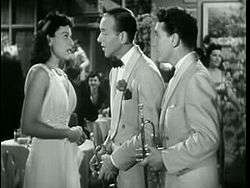Second Chorus
Second Chorus is a 1940 Hollywood musical comedy film starring Paulette Goddard and Fred Astaire and featuring Artie Shaw, Burgess Meredith and Charles Butterworth, with music by Artie Shaw, Bernie Hanighen and Hal Borne, and lyrics by Johnny Mercer. The film was directed by H. C. Potter and produced independently for Paramount Pictures by Boris Morros. The film's copyright expired in 1967 and it is now in the public domain,[2] with the result that, prior to its recent restoration, it tended to circulate in seriously degraded prints.
| Second Chorus | |
|---|---|
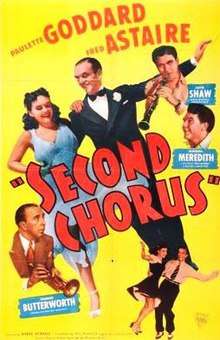 re-release poster | |
| Directed by | H. C. Potter |
| Produced by | Boris Morros |
| Written by | Frank Cavett (orig. story)[1] |
| Screenplay by | Elaine Ryan Ian McLellan Hunter Johnny Mercer (contributor) Ben Hecht (uncredited) |
| Starring | Paulette Goddard Fred Astaire |
| Music by | Artie Shaw Hal Borne Johnny Mercer |
| Cinematography | Theodor Sparkuhl |
| Edited by | Jack Dennis |
Production company | |
Release date | December 3, 1940 (US) |
Running time | 84 minutes |
| Country | United States |
| Language | English |
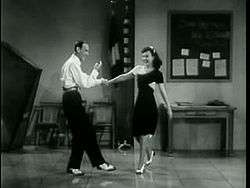
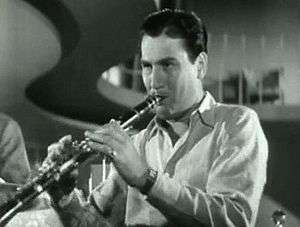
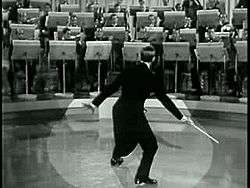
Plot
Danny O'Neill (Fred Astaire) and Hank Taylor (Burgess Meredith) are friends and rival trumpeters with "O'Neill's Perennials", a college band. Both have managed to prolong their college careers by failing seven years in a row. At a performance, Ellen Miller (Paulette Goddard) catches Danny's and Hank's eyes. She serves them a notice for her boss, a debt collector, but the fast-talking O'Neill and Taylor soon have her working as their manager.
Tired of losing gigs to the Perennials, Artie Shaw, playing himself, comes to woo Ellen away to be his booking manager. She tries to get Danny and Hank an audition for Shaw's band, but their jealous hi-jinks get them fired.
Ellen talks Shaw into letting rich wannabee musician J. Lester Chisholm (Charles Butterworth) back a concert. It looks like the jig is up when Hank pretends to be Ellen's jealous husband, and then her brother. Danny and Hank manage get Chisholm back on board, then get Shaw to agree to put Danny's song into the show. All they have to do is keep Chisholm and his mandolin (which he wants to play in the concert) away from Shaw until after the show; the solution is sleeping pills to knock Chisholm, and incidentally Hank, out.
To Ellen's relief, Danny finally acts professionally, arranging his number for the show, which Shaw says "has really grown up into something special." He hands the baton to Danny, who successfully dance-conducts his own composition.
Cast
- Fred Astaire as Danny O'Neill
- Paulette Goddard as Ellen Miller
- Artie Shaw as himself
- Charles Butterworth as Mr. Chisholm
- Burgess Meredith as Hank Taylor
- Frank Melton as Stu
- Jimmy Conlin as Mr. Dunn
- Don Brodie as clerk
- Marjorie Kane as secretary
- Joan Barclay as receptionist
- Willa Pearl Curtis as scrubwoman
- Billy Butterfield as himself / Shaw's Band Trumpeter
Cast notes
- Billy Butterfield dubbed Burgess Meredith's trumpet solo.
Musical numbers
Hermes Pan collaborated with Astaire on the choreography.
- "Sugar": Astaire is shown leading a college band in a jazz standard by Marceo Pinkard. Astaire's trumpet playing is dubbed by Bobby Hackett, while Meredith's is dubbed by Shaw's bandsman Billy Butterfield.
- "Everything's Jumping": A brief number for Artie Shaw and his band.
- "I Ain't Hep To That Step But I'll Dig It": This comic song and dance duet for Astaire and Goddard was, according to Goddard - whose dance ability and experience was limited - done "just once, one Saturday morning ... I'm glad it was all right for I couldn't have done it again". It was the last of Astaire's duets to be filmed entirely in one take. The dance incorporates a new step, the "Dig It" which involved snapping both feet together and then hopping while keeping them together. The rest of the dance involves original use of partnered teetering, scooting and dodging steps with some jitterbugging thrown in. In his first film appearance, Hermes Pan can be seen as the clarinetist in the band (standing furthest back).
- "Sweet Sue": Another Astaire (Hackett) and Meredith (Butterfield) mime routine, this time to a Victor Young standard.
- "Love Of My Life": Johnny Mercer and Shaw wrote this song one day over lunch at Mercer's house, and when the excited Shaw wanted to show it to the studio, Mercer persuaded him to wait three weeks explaining: "If you tell them you just wrote it over lunch they won't think it's any good". It is delivered by Astaire to Goddard and garnered an Academy Award nomination for Best Song.
- "Kamarinskaya": A brief comic number for Astaire, who plays a Russian doing a Moiseyev-style dance to the traditional Russian melody while singing a pseudo-Russian version of "Love Of My Life" in a thick accent.
- "Poor Mr. Chisholm ": Accompanying himself on the piano Astaire sings this folk-parody Mercer-Henighen number for Shaw's approval.
- "Concerto for Clarinet": Like many jazzmen of his time – Benny Goodman, Paul Whiteman, Jimmy Dorsey and Duke Ellington among them – Shaw occasionally produced pieces with titles more commonly associated with classical music; Shaw, however was characteristically modest about this attractively episodic extended piece, composed especially for the film: "I never intended it for posterity ... It filled a spot in the picture". It features the string section – Shaw's "mice men" as he liked to call them, which he had just added to band – most famously in "Frenesi" - the year before.
- "Hoe Down The Bayou/Poor Mr. Chisholm (dance)": Astaire "conducts" the band while performing a tap solo.
The only number involving Astaire and Pan, possibly the most important choreographic collaboration in the history of filmed dance - was "Me And The Ghost Upstairs", which was cut from the final film, but is currently included in some regional DVD versions of the film. In it, Pan, shrouded in a sheet, creeps up on Astaire and begins to mimic him. The two then dance a riotous number involving Lindy lifts and jitterbugging. It is not really finished to Astaire's usual standards, and this, combined with the fact that the figure under the shroud is obviously male, wearing women's high heels, may have led to its deletion.
Production
In a 1968 interview, Astaire described this effort as "the worst film I ever made." Astaire admitted that he was attracted to the film by the opportunity to "dance-conduct this real swingin' outfit". In an interview shortly before his death, Shaw admitted this film put him off acting. Astaire and Shaw shared a striking series of personality traits in common: an obsessive perfectionism and seemingly endless appetite for retakes, profound musicality and love of jazz, personal modesty and charm, and in a late interview Shaw expressed his opinion of Astaire: "Astaire really sweat - he toiled. He was a humorless Teutonic man, the opposite of his debonair image in top hat and tails. I liked him because he was an entertainer and an artist. There's a distinction between them. An artist is concerned only with what is acceptable to himself, where an entertainer strives to please the public. Astaire did both. Louis Armstrong was another one."[3]
References
Notes
- Decker, Todd. Music Makes Me: Fred Astaire and Jazz Berkeley, California: University of California Press, 2011. ISBN 0520950062
- Simosko, Vladimir (2000). Artie Shaw: A Musical Biography and Discography. Scarecrow Press. ISBN 9780810833975.page 89
- Interviewed in Fantle, Dave and Johnson, Tom. Reel to Real. Badger Books LLC, 2004, p.304. ISBN 1932542043
Bibliography
- Mueller, John. Astaire Dancing - The Musical Films of Fred Astaire, Knopf 1985, ISBN 0-394-51654-0
- Shaw, Artie. Artie Shaw, Television documentary, British Broadcasting Corporation, 2003
External links
| Wikimedia Commons has media related to Second Chorus. |
- Second Chorus on IMDb
- Second Chorus at AllMovie
- Second Chorus at the TCM Movie Database
- Second Chorus at the American Film Institute Catalog
- Second Chorus is available for free download at the Internet Archive
- Second Chorus in HD on YouTube
- "Me and the Ghost Upstairs" deleted scene with Fred Astaire and Hermes Pan on YouTube
- Artie Shaw playing Everything's Jumpin' on YouTube
- Artie Shaw playing Concerto for Clarinet on YouTube
